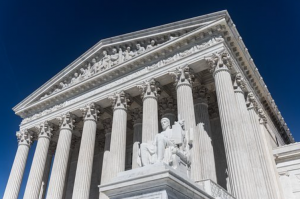Since Trump is no longer president, the Supreme Court has agreed to dismiss the case.
The United States Supreme Court has dismissed a lawsuit filed against President Donald Trump and his Twitter account, saying the end of Trump’s term in office has made the complaint irrelevant.
According to NBC News, the case revolves around former commander-in-chief’s aggressive Twitter actions.
While President Trump was known for posting often-inflammatory rhetoric on his social media accounts, he was also quick to block critics. The plaintiffs include at least seven people who were blocked by Trump’s official Twitter account, @realDonald Trump.
@realDonaldTrump has since been banned by Twitter for repeatedly violating the platform’s terms of use.
When the case first went to court, the plaintiffs won judgments against Trump.
In the lower courts, judges found that the Trump critics’ First Amendment rights had been violated when the commander-in-chief blocked them.
The Court Appeals for the 2nd Circuit, for instance, held that President Trump’s Twitter account was akin to a public forum. Since Trump often discussed official matters—including confidential matters—on Twitter, Americans should be entitled to engage directly with the President of the United States, regardless of their political beliefs or opinions on the Trump administration.
Nevertheless, the Justice Department had urged the Supreme Court to reverse the lower court rulings.

Although the Justice Department maintained that President Trump’s account was the chief executive’s “official” account, government attorneys claimed that any decisions to block users were personal.
However, the Department of Justice backtracked at the very last minute—just one night before Joe Biden was expected to take his oath of office, the agency asked the Supreme Court to dismiss the case as moot and vacate the lower court rulings.
While Justice Clarence Thomas supported the department’s request to vacate the lower court rulings, he did express some concern that “applying old doctrines to new digital platforms is rarely straightforward.” Clarence further suggested that such First Amendment issues demand further consideration.
Clarence also opined that large and powerful social media platforms are problematic in and of themselves.
In a separate opinion, Clarence noted that Twitter—a privately-owned company—was able to ban President Trump without outside input, largely because of his contentious political beliefs.
“As Twitter made clear,” Clarence wrote, “the right to cut off speech lies powerfully in the hands of private digital platforms.”
Katie Fallow, a senior staff attorney at the Knight Institute—which advocates for Americans’ First Amendment Rights—represented Trump’s Twitter critics.
Fallow, for her part, asked the justices to leave the lower court rulings intact.
“There is no widespread recognition that the principles we established in this case are important to protecting the vitality of public forums that are increasingly important to our democracy,” Fallow said.
Sources
Supreme court dismisses case brought by Twitter users Trump blocked
Supreme Court dismisses case over Trump and Twitter critics
Supreme Court dismisses lawsuit over Trump’s Twitter account


Join the conversation!